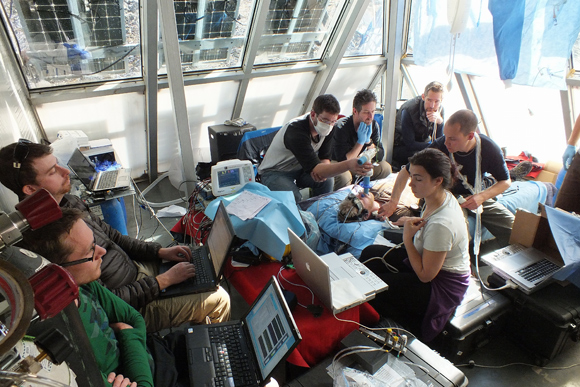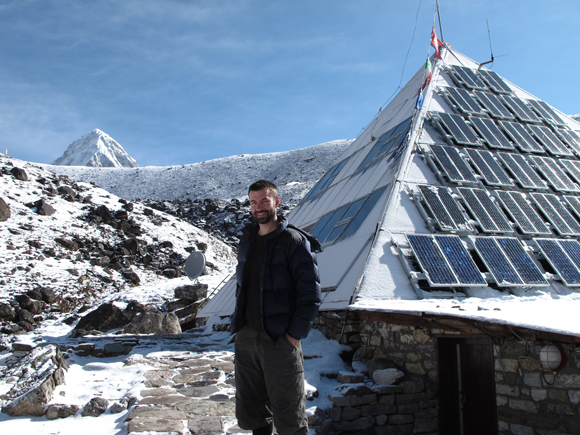
Team members of Everest 2012: UBC’s International Research Expedition, conduct one of several human health experiments at Mount Everest’s Pyramid Lab.
High altitude impacts on human cardio-vascular health
Who: Members of Everest 2012, UBC’s International Research Expedition
When: 7 to 8:30 p.m., Thursday, November 15,
Where: Ashnola Building Lecture Theatre, Room PL107, Okanagan College, 583 Duncan Avenue West, Penticton
Registration: Free online registration at Everest2012penticton.eventbrite.ca
A pioneering UBC research expedition studying the human health effects of changes in blood flow and chronic oxygen deprivation at high altitudes put a team of global scientists on top of the world last May.
Now the scientists are ready to disclose their initial findings in a panel discussion at Okanagan College’s Penticton campus.
This will be the first opportunity for the public to listen to the experts discuss their experiments and experiences at Everest’s Pyramid laboratory to investigate the effects of chronic disease.
Expedition leader Philip Ainslie, UBC’s Okanagan campus researcher of the year and Canada Research Chair in cerebrovascular physiology, leads the discussion.
“Research at high altitude provides an excellent means to examine physiological adaptation to chronic reductions in the pressure of oxygen,” says Ainslie. “Results of the studies have the potential to substantially improve our understanding of biological adaptation to chronic hypoxia.”
Ainslie, an associate professor in the School of Health and Exercise Sciences, will be joined by students and faculty members who took part in this historic venture, sharing their initial research findings from Everest for the first time at a panel discussion at Okanagan College’s Penticton campus on Thursday Nov. 15 at 7 p.m. Location is the Ashnola Building Lecture Theatre, Room PL107, Okanagan College, 583 Duncan Avenue West, Penticton.
Greg DuManoir, Okanagan College professor of human kinesiology and member of the expedition, is moderator. Members of the panel include Nia Lewis, international student and post-doctoral fellow; Jon Smirl, PhD student; and Ryan Hoiland, undergraduate student. Expedition member Gordon Binsted, Dean of the Faculty of Health and Social Development, will introduce the panel.
Using themselves as study subjects, Everest 2012 researchers measured their cerebrovascular, cardiopulmonary, and neurocognitive health to gauge the effects of acute mountain sickness and sleep apnea. The symptoms are characteristic of many chronic conditions, including heart attack, stroke and respiratory failure.
The event is free. Register online at: Everest2012penticton.eventbrite.ca

Greg DuManoir, a human kinetics professor at Okanagan College, is seen outside the Pyramid Laboratory near Everest base camp.
— 30 —